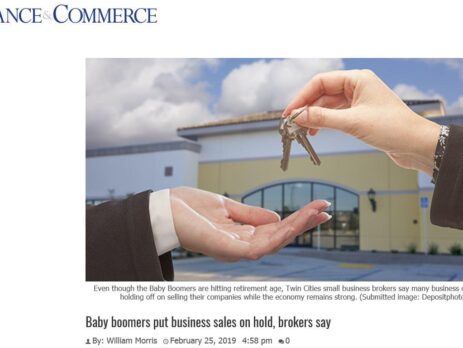Transitions In Business quoted in latest edition of Finance & Commerce
Sam Thompson shares his expertise as a seasoned business broker in an article explaining why baby boomers are holding on to their businesses in the Feb 26, 2019 edition of the Finance & Commerce newspaper.
Baby boomers put business sales on hold, brokers say
What happens to mom and pop stores when all the Moms and Pops are ready to retire?
Many small businesses are owned by members of the baby boom generation, who are increasingly hitting retirement age and looking to step back from their companies. For the third year in a row, small business sales nationwide set a record, according to data collected by national broker BizBuySell. Among owners surveyed for the report, the aging of the baby boomers was the most common explanation for the increase in company sales and listings.
The Twin Cities did not make BizBuySell’s top 10 list for transactions closed, although it ranks fifth among U.S. markets for median sale price. Minnesota brokers say they’ve had brisk business in the past several years, although they haven’t seen a huge spike as older business owners retire.
One reason for that? Many business owners are holding on to make the most of the strong economy, said Sam Thompson, owner of Edina-based brokerage Transitions in Business.
“We are certainly seeing boomers with good businesses holding on and playing the timing game,” Thompson said. “They know they want to sell, but it’s hard to walk away from a good business that’s cash-flowing nicely.”
At Calhoun Cos., also based in Edina, co-owner and President Andy Kocemba said he expects it will take an economic jolt to shake some business owners loose.
“As much as it’s about numbers, it’s maybe more so about emotional or other influential factors. It’s much more about emotions than checking the boxes,” he said of owners contemplating a sale. “I think with a little more volatility in the market, or if we see a correction this year, we’ll start to see some of those baby boomers say, maybe now is the time to come to the market.”
Waiting until a downturn might give business owners another year or 18 months of profits, but could also hurt them when they do take the business to market, said Bruce Strong, state director for Minnesota’s Small Business Development Centers. Successfully selling a company in many cases can take years of accounting work and other preparations to attract the seller’s desired price, he said.
“We find it takes a lot longer than people think it does to transition out of a business. They typically need to do some accounting preparation before they do that,” Strong said, noting many businesses handle their accounting differently when trying to minimize taxes than when trying to maximize value for a sale. “It may take as much as three to five years for any course corrections in their accounting practices to show up on the bottom line in terms of valuation.”
If the economy hits a bump before a business is ready to sell, it can throw the entire process into jeopardy.
“Buyers can be very concerned when there is a downturn with the business,” Thompson said. “If the most recent quarter has a downturn, they may either walk from the deal, or they certainly may try to renegotiate the price.”
Many economists are predicting a slowdown in global growth in 2019 but say a full recession is unlikely this year. That could be enough to convince some holdout small businesses to hit the market, Kocemba said.
“You kind of want to see, and what I’m anticipating or hoping for, is enough volatility or question marks for business owners to say, ‘Do I want to go through ups and downs again or do I want to sell?’ without necessarily hurting their business,” he said.
Meanwhile, brokers are also seeing strong interest from potential buyers, Strong said, with many young entrepreneurs interested in taking over an existing business rather than starting from square one.
That high demand has pushed up sale prices, Thompson said.
“There are so many buyers out there that it’s certainly a seller’s market right now. … In the past couple of years, the multiples have gone up,” he said, noting valuations can vary wildly between different industries. “For small businesses in general, [sale prices] used to be a multiple of two to four, and that’s jumped now to three to five.”
Strong said his business development centers are doing outreach and education to ensure small business owners know what they need to do to prepare their businesses for sale. The worst-case scenario, he said, is an owner decides he or she can’t sell the business and decides to close it down for good.
“Particularly in Greater Minnesota, the loss of that local hardware store is devastating to that community,” he said, describing small businesses as the fabric of many local communities. “It may only represent two or three jobs, but it represents far more than those two or three jobs.”
With business remaining steady, brokers are keeping an eye on broader economic trends to predict when small company listings may spike. Sooner or later, they say, simple demographics will see Minnesota catch up with the rest of the national market.
“The baby boomers, whether they plan to or not, eventually run into a point where they are no longer able to or wish to run their small business,” Kocemba said. “They’ll continue coming to the market as they reach that point, whether the economy is strong or not.”
Visit https://finance-commerce.com/2019/02/baby-boomers-put-business-sales-on-hold-brokers-say/ to view the online version of the article in Finance & Commerce.

